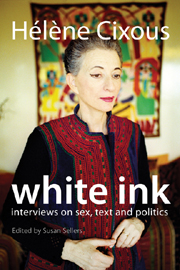Book contents
- Frontmatter
- Contents
- Acknowledgements
- Editor's note
- Preface: On being interviewed
- Part I Writing the enigma
- Part II Writing the feminine
- Part III Writing and politics
- Part IV Writing and theatre
- Part V Writing roots
- Part VI On painting, music and nature
- Part VII Dialogues
- Envoi: But the Earth still turns, and not as badly as all that
- Bibliography of Hélène Cixous's works
- Index
Preface: On being interviewed
- Frontmatter
- Contents
- Acknowledgements
- Editor's note
- Preface: On being interviewed
- Part I Writing the enigma
- Part II Writing the feminine
- Part III Writing and politics
- Part IV Writing and theatre
- Part V Writing roots
- Part VI On painting, music and nature
- Part VII Dialogues
- Envoi: But the Earth still turns, and not as badly as all that
- Bibliography of Hélène Cixous's works
- Index
Summary
This interview was conducted in English at Hélène Cixous's home in Paris on 4 September 2007
ss In an early interview with Henri Quéré, you say that for you the spoken word is secondary to the written word. And yet it seems to me that in your interviews — of which you've done many over the course of your career — you often take a great deal of pleasure in the possibilities of the spoken word. There is a sense, in your interviews, that the spoken word can transport in the way you suggest writing transports us in our thinking and understanding. Reading through your interviews, I am also struck that you frequently put things differently to the way you put them in your writing. Do you still feel that the spoken word is secondary to the written word? How do you view your interviews?
cixous I feel I'm not an artist when I write orally, which is obvious because you can't be equivocal — or at least I can't — when you speak. The indirectness, the obliquity of writing, the multiplicity — of layers of signifiers etc. — is almost excluded from the act of writing orally. Why do I say writing orally? Because it is writing. It's simpler, thinner — a threadlike writing. I don't reject the idea of it, but I know it's less illuminated, less inspired. Even the circumstances are less favourable.
- Type
- Chapter
- Information
- White InkInterviews on Sex, Text and Politics, pp. xiv - xviPublisher: Acumen PublishingPrint publication year: 2008



